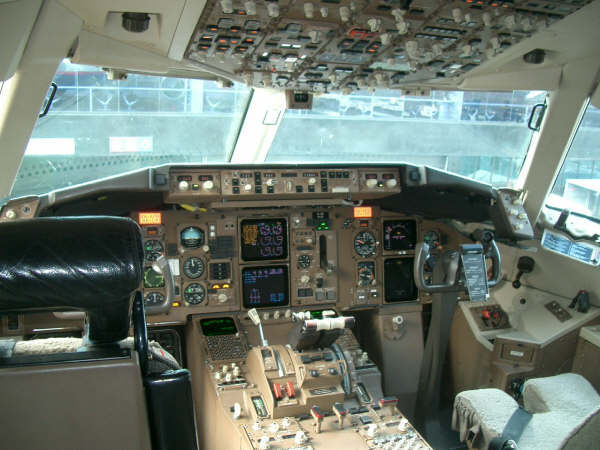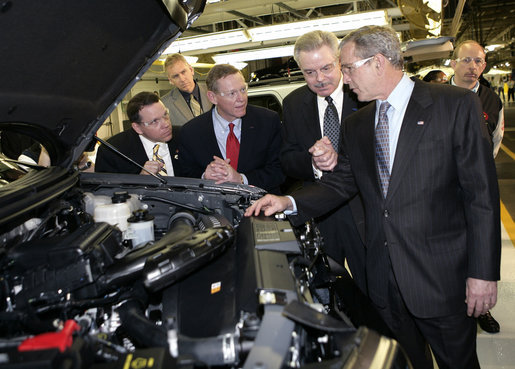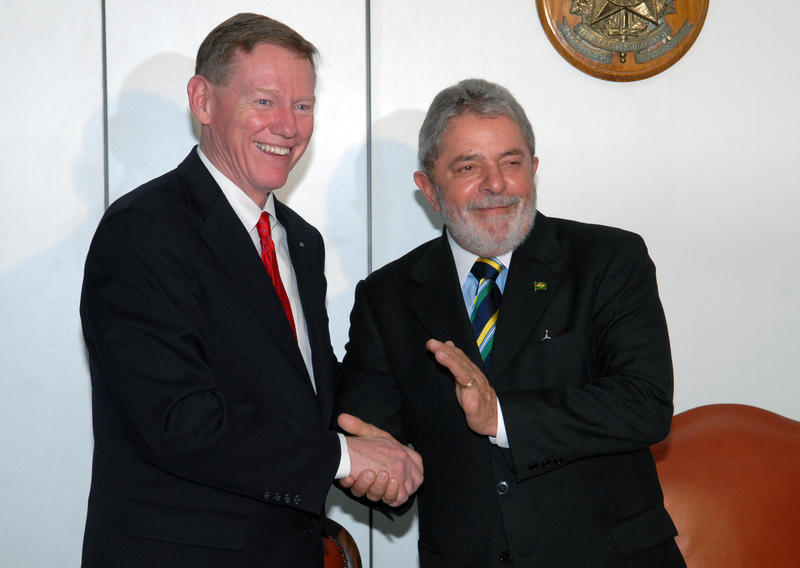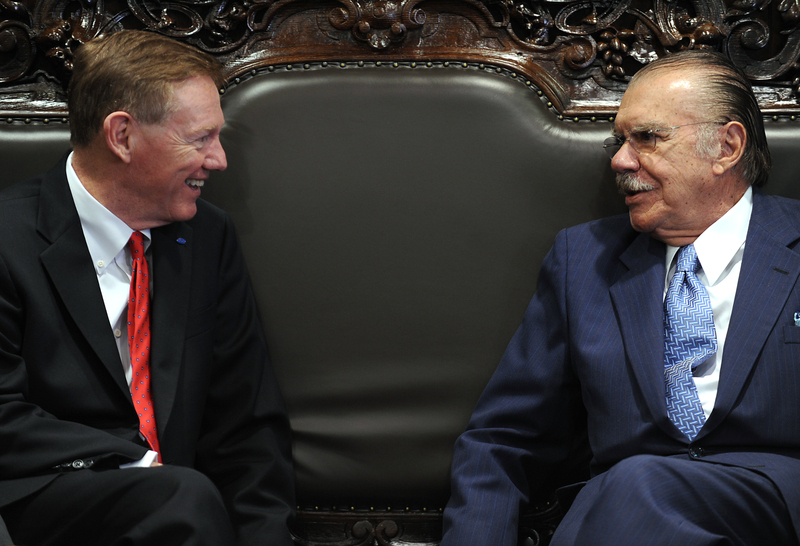1. Early life and education
Alan Mulally's formative years and academic pursuits laid the groundwork for his distinguished career, fostering a keen interest in engineering and leadership.
1.1. Early life
Mulally was born on August 4, 1945, in Oakland, California. His parents, Lauraine Lizette (Clark) and Charles R. Mulally, met at a USO dance. He spent his childhood in his mother's hometown of Lawrence, Kansas, where he was an active member of the Plymouth Congregational Church. He regarded Reverend Dale Turner as a significant mentor and source of inspiration, often observing the minister's interaction with the congregation from the front of the church. At the age of 17, Mulally found himself deeply motivated by President John F. Kennedy's ambitious challenge to send a man to the moon, which ignited his passion for aerospace and engineering.
1.2. Education
Mulally pursued his higher education at the University of Kansas, which was also his mother's alma mater. He earned a Bachelor of Science degree in 1968 and a Master of Science degree in 1969, both in aeronautical and astronautical engineering. During his time at the university, he was also a member of the Kappa Sigma fraternity. Furthering his academic credentials, Mulally attended MIT's Sloan School of Management, where he received a Master's degree in Management (S.M.) as a Sloan Fellow in 1982.
2. Career
Mulally's career journey spans decades of significant contributions to both the aerospace and automotive industries, marked by his leadership in challenging environments and successful turnarounds.
2.1. Boeing
Mulally began his professional career with Boeing immediately after graduating college in 1969, joining the company as an engineer. He quickly rose through the ranks, holding various engineering and program management positions. His early contributions were instrumental in the development of several iconic aircraft, including the Boeing 727, 737, 747, 757, 767, and Boeing 777 projects. A notable achievement during this period was his leadership of the cockpit design team for the 757/767 project. This revolutionary design introduced the first all-digital flight deck in a commercial aircraft, established the second two-man crew for long-range aircraft after the Airbus A300, and allowed for a common type rating for pilots across two different aircraft models, simplifying training and operations.

From September 1992, Mulally served as vice president and general manager for the 777 program, after initially serving as its director of engineering. He was widely recognized for his role in elevating Phil Condit's "Working Together" philosophy, which he propagated throughout and beyond the 777 program. In 1994, he was promoted to senior vice president of Airplane Development, overseeing all airplane development activities, flight test operations, certification processes, and government technical liaison. By 1997, Mulally became the president of Boeing Information, Space & Defense Systems and a senior vice president. He held this position until 1998 when he was appointed president of Boeing Commercial Airplanes, with chief executive officer duties added in 2001.
Mulally's leadership was particularly crucial in the mid-2000s, where he is credited with Boeing Commercial Airplanes' resurgence in the competitive landscape against Airbus. Despite being considered a leading internal candidate for the CEO position of the parent The Boeing Company following the forced resignations of Phil Condit in 2003 and Harry Stonecipher in 2005, Mulally was passed over on both occasions. His performance at Boeing earned him the distinction of "Person of the Year" for 2006 from Aviation Week & Space Technology.
2.2. Ford Motor Company
Mulally's tenure at Ford Motor Company marked a pivotal period in the automaker's history, characterized by his strategic vision and unwavering commitment to a turnaround.

Mulally was recommended to Ford by former Ford CEO Donald Petersen and was named president and CEO of Ford Motor Company on September 5, 2006, succeeding Bill Ford, who transitioned to executive chairman. His initial appointment drew some attention when he publicly referred to his Lexus LS430 as the "finest car in the world" just before his selection was announced. Although he faced some criticism for this, he swiftly switched to driving Ford models, demonstrating his commitment to the brand he now led. One of his early decisions was to reinstate the Taurus nameplate, expressing his bewilderment at its previous discontinuation given its historical success.
2.2.1. Turnaround strategy
Mulally quickly implemented a comprehensive restructuring plan at Ford, known as "The Way Forward", aimed at reversing the company's significant losses and declining market share. His initiatives focused on stringent cost-cutting measures, which rapidly led to Ford's first profitable quarter in two years. A key element of his strategy involved negotiating four new agreements with the United Auto Workers, successfully reducing labor costs from 76 USD per hour to 55 USD per hour. Mulally often communicated the urgency of the situation to employees, stating candidly in a town meeting with information technology staffers in February 2007, "We have been going out of business for 40 years," a message he reiterated across employee groups to foster a shared sense of purpose and commitment to transformation. He also established a rigorous "Business Plan Review" (BPR) meeting held every Thursday at 7 a.m. in the "Thunderbird Room" at Ford's headquarters in Dearborn, Michigan, a transparent and accountable forum for assessing progress and addressing challenges.
2.2.2. Key financial decisions
In a bold and crucial move in 2006, Mulally orchestrated the borrowing of 23.60 B USD by mortgaging virtually all of Ford's assets. While initially perceived by some as a sign of desperation, Mulally articulated his intention to use these funds to finance a major overhaul and establish "a cushion to protect for a recession or other unexpected event." This foresight proved pivotal, as the loan is now widely credited with stabilizing Ford's financial position, uniquely enabling the company to navigate the automotive industry crisis of 2008-2009 without resorting to government loans, unlike its crosstown rivals General Motors and Chrysler, both of whom declared bankruptcy and required federal bailouts. Mulally did, however, testify before the United States Congress in support of government loans for General Motors and Chrysler, emphasizing the potential cascading impact on the broader economy and other automobile manufacturers, particularly parts suppliers, if a collapse were to occur. Ford also suspended dividends to shareholders as part of the strategy. In May 2009, William Clay Ford, Jr., who hired Mulally, praised his leadership, stating that Mulally "was the right choice [to be CEO], and it gets more right every day."


Mulally also made strategic decisions regarding Ford's diverse brand portfolio. In 2007, he oversaw the sale of Jaguar Cars and Land Rover to Tata Motors, an Indian car and truck manufacturer, for 2.30 B USD. While this was considerably less than what Ford had paid for these brands under a previous CEO, Mulally expressed "no regrets," prioritizing focus on the core Ford brand. Analysts later confirmed the prudence of this decision, noting that Ford might have secured an even lower price or no buyer at all had they waited until 2008, when rising oil prices caused a plummet in Jaguar Land Rover sales, leading Tata to seek a bailout from the British government. Additionally, Mulally divested Aston Martin and Volvo Cars, and significantly reduced Ford's stake in Mazda, streamlining the company's operations.
2.2.3. Public image and recognition
Mulally's leadership at Ford was marked by both pragmatic actions and widespread acclaim. Amid mounting losses in 2008, Ford announced a proposal on December 2, 2008, to cut Mulally's salary to 1 USD per year if the company received and utilized government loans. Earlier, he and other industry leaders faced criticism for traveling to Washington, D.C., in corporate jets to request government aid. In response, Mulally subsequently traveled from Detroit to Washington by a Ford-built hybrid electric vehicle, and importantly, he sold all but one of the company's corporate jets, a move that resonated positively with the public and demonstrated his commitment to austerity and responsible stewardship.
In 2008, Mulally's total compensation amounted to 13.56 M USD, comprising a base salary of 2.00 M USD, stock awards of 1.85 M USD, and option awards of 8.67 M USD. This figure represented a 37.4% decrease compared to his compensation in 2007, reflecting the company's financial challenges.
His significant achievements at Ford garnered him numerous accolades. In 2009, he was included in the Time 100 list, with Microsoft CEO Steve Ballmer writing that Mulally "understands the fundamentals of business success as well as any business leader I know." In 2011, Mulally was recognized as "Person of the Year" by the Financial Times ArcelorMittal Boldness in Business Awards and was also named "CEO of the Year" by Chief Executive magazine. Furthermore, he received an Edison Achievement Award in 2011 for his unwavering commitment to innovation throughout his career. In 2012, his alma mater, the University of Kansas, bestowed upon him the honorary degree of Doctor of Science, acknowledging his notable contributions to engineering and the transportation industry.
In November 2012, Ford announced that Mulally would remain with the company at least through 2014. However, reports in September 2013 indicated that Mulally might step down earlier as he explored other roles. The board was reportedly sympathetic to this move. He ultimately retired on July 1, 2014, and was succeeded by Mark Fields.
2.3. Post-Ford activities
Following his retirement from Ford, Mulally continued to contribute his expertise to prominent organizations. On July 9, 2014, he joined the Board of Directors of Google, which later became Alphabet. He remained on the board until at least 2024. In April 2016, Mulally took on a role as a senior fellow at Seattle University's Albers School of Business. He was also considered for the position of United States Secretary of State in the first Trump administration in 2016, though the role ultimately went to ExxonMobil CEO Rex Tillerson.
3. Management philosophy and style
Mulally's leadership is characterized by a distinctive management philosophy centered on collaboration, transparency, and a relentless focus on core objectives. He is known for his principle of managing "energy" in addition to "time," advocating that leaders identify and draw upon sources of personal energy, such as family, exercise, and spiritual well-being, to sustain their mental and physical stamina. He even applied this philosophy at home, holding weekly "family BPR" meetings to review needs and ensure mutual support.
His professional approach, often dubbed the "Working Together" philosophy, emphasized accountability and open communication. The weekly "Business Plan Review" meetings at Ford served as a critical platform for this, fostering a culture where challenges were openly discussed and collective solutions were sought, rather than concealing problems. Mulally famously challenged conventional wisdom, exemplified by his statement regarding the profitability of smaller vehicles: "Everybody says you can't make money off small cars. Well, you'd better damn well figure out how to make money because that's where the world is going." This reflects his pragmatic and forward-thinking approach to adapting to market realities. His willingness to reduce labor costs through negotiation with the United Auto Workers, while maintaining jobs and avoiding a bailout, also showcases a balanced and socially responsible approach to business. Mulally's commitment to the company was also evident in his personal choices, such as living within 3 mile of Ford's global headquarters in Dearborn, Michigan.
4. Awards and honors
Alan Mulally has received numerous prestigious awards and honors throughout his distinguished career, recognizing his impactful leadership and contributions to both the aerospace and automotive industries.
- 2006:** Named "Person of the Year" by Aviation Week & Space Technology for his performance at Boeing.
- 2009:** Included in the Time 100 list, recognizing the world's most influential people.
- 2011:** Awarded "Person of the Year" by the Financial Times ArcelorMittal Boldness in Business Awards.
- 2011:** Named "CEO of the Year" by Chief Executive magazine.
- 2011:** Received an Edison Achievement Award for his commitment to innovation.
- 2012:** Awarded an honorary Doctor of Science degree by the University of Kansas, his alma mater.
- 2015:** Inducted into the International Air & Space Hall of Fame at the San Diego Air & Space Museum.
- 2017:** Recipient of the Bower Award for Business Leadership.
5. Legacy and influence
Alan Mulally's legacy is defined by his profound and lasting impact on the corporate culture and financial stability of two major global companies, Boeing and Ford Motor Company, and by extension, on the aerospace and automotive industries at large. At Boeing, he is credited with reigniting the commercial airplane division's competitive edge, fostering a more collaborative and efficient engineering environment through his "Working Together" philosophy.
His tenure at Ford, however, is arguably his most celebrated and influential contribution. Mulally arrived at Ford during a period of deep financial crisis, yet he successfully steered the company back to profitability without the need for a government bailout, a distinction that set Ford apart from its Detroit rivals. This achievement not only secured the jobs of thousands of employees but also preserved the company's independence, thereby avoiding taxpayer burden and demonstrating a model of corporate self-reliance during a national economic downturn. This approach aligns with a focus on social equity, ensuring the well-being of the workforce and local communities without reliance on public funds. His strategic decision to mortgage company assets, though risky, was a testament to his bold vision and proved to be a masterstroke that provided crucial liquidity during the economic crisis.
Mulally's emphasis on transparency, as evidenced by his "Business Plan Review" meetings, transformed Ford's internal operations, fostering open communication and collective problem-solving across all levels of the organization. He instilled a culture of accountability and a unified vision, famously summarizing the complex automotive business by highlighting its relative simplicity compared to aerospace: "An automobile has about 10,000 moving parts, right? An airplane has two million, and it has to stay up in the air." This perspective helped demystify the challenges and galvanize the Ford team. His willingness to lead by example, reducing his own salary and divesting corporate assets during difficult times, further solidified his image as a leader genuinely committed to the company's and its employees' well-being. Mulally's management philosophy, which integrates personal energy management with professional rigor, continues to influence leadership thinking, highlighting a holistic approach to executive effectiveness. His legacy is one of strategic foresight, unwavering determination, and a deep commitment to revitalizing institutions through collaborative effort and fiscal responsibility.
6. External links
- [https://web.archive.org/web/20070219051013/http://media.ford.com/article_display.cfm?article_id=24203 Biography: Alan Mulally at Ford Motor Company]
- [https://web.archive.org/web/20100726095141/http://investing.businessweek.com/businessweek/research/stocks/people/person.asp?personId=370889&ticker=F:US Profile at Bloomberg Businessweek]
- [https://web.archive.org/web/20061115093326/http://www.newsmeat.com/ceo_political_donations/Alan_Mulally.php Alan Mulally's federal campaign contributions from Newsmeat (2006 archive copy)]
- [https://www.designnews.com/aerospace/love-flying/199697698439871 For the love of flying by Design News]
- [https://charlierose.com/videos/15706 Alan Mulally interview on Charlie Rose]
- [https://www.c-span.org/person/?1022263 Alan Mulally on C-SPAN]